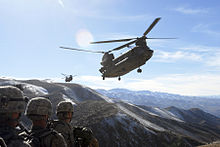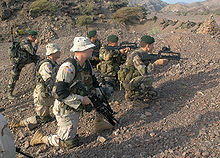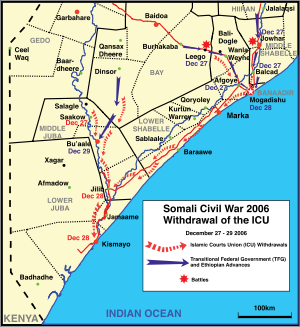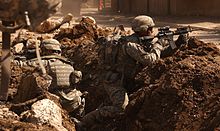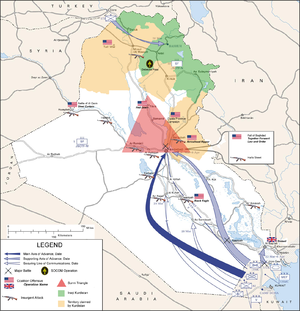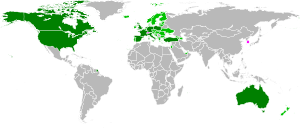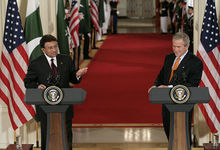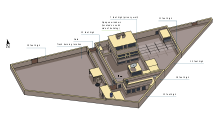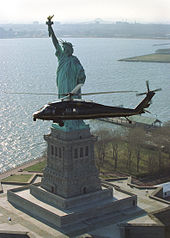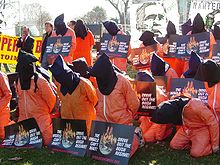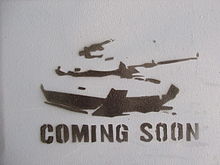- War on Terror
-
This article is about the international military campaign. For the board game, see War on Terror (game).
War on Terror 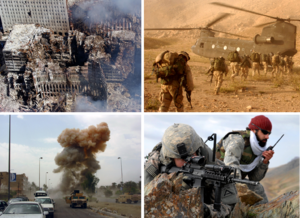
Clockwise from top left: Aftermath of the 9/11 attacks; US infantry in Afghanistan; a US soldier and Afghan interpreter in Zabul Province, Afghanistan; explosion of an Iraqi car bomb in BaghdadDate September 11, 2001 – present (10 years, 73 days) Location Global (esp. Middle East, parts of Asia and Africa, Europe and North America) Status War in Afghanistan (2001–present): - Fall of the Taliban government in Afghanistan
- Destruction of Al-Qaeda camps
- Taliban insurgency
- War in North-West Pakistan
- Killing of Osama bin Laden
- Fall of the Ba'ath Party government in Iraq
- Execution of Saddam Hussein
- Free elections
- Iraqi insurgency
Other:
Belligerents  NATO participants:
NATO participants:
 United States
United States United Kingdom
United Kingdom- Other NATO countries
- (List of members) Non-NATO participants:
 Afghanistan
Afghanistan Australia
Australia El Salvador
El Salvador Ethiopia
Ethiopia Iraq
Iraq Israel
Israel Kenya
Kenya Republic of Korea
Republic of Korea Lebanon
Lebanon New Zealand
New Zealand Pakistan
Pakistan Philippines
Philippines South Africa
South Africa
International missions:
 NATO—ISAF
NATO—ISAF- Operation Enduring Freedom Allies
(note: most contributing nations are included in the international operations)
Main targets: Others:
 Islamic Movement of Uzbekistan
Islamic Movement of Uzbekistan Jammu Kashmir Liberation Front
Jammu Kashmir Liberation Front East Turkestan Islamic Movement
East Turkestan Islamic Movement Taliban
Taliban Caucasian militants
Caucasian militants Al-Shabaab
Al-Shabaab Islamic Courts Union
Islamic Courts Union Fatah al-Islam
Fatah al-Islam- Jundallah
 Lashkar-e-Taiba
Lashkar-e-Taiba Jaish-e-Mohammed
Jaish-e-Mohammed Jemaah Islamiyah
Jemaah Islamiyah Abu Sayyaf
Abu Sayyaf Moro Islamic Liberation Front
Moro Islamic Liberation Front Moro National Liberation Front
Moro National Liberation Front Iraqi insurgents
Iraqi insurgents Rajah Sulaiman movement
Rajah Sulaiman movement Baath Party Loyalists
Baath Party Loyalists Mujahideen Pattani Movement (BNP)
Mujahideen Pattani Movement (BNP)
Commanders and leaders  Gen. Tommy Franks (CENTCOM commander 2001–2003),
Gen. Tommy Franks (CENTCOM commander 2001–2003),
 Gen. John Abizaid (ISAF commander 2009–present),
Gen. John Abizaid (ISAF commander 2009–present),
 Adm. William J. Fallon (CENTCOM commander 2007–2008),
Adm. William J. Fallon (CENTCOM commander 2007–2008),
 Gen. David Petraeus (CENTCOM commander 2008–2011),
Gen. David Petraeus (CENTCOM commander 2008–2011),
 Gen. Stanley A. McChrystal (ISAF commander 2009–2010),
Gen. Stanley A. McChrystal (ISAF commander 2009–2010),
 Gen. Ashfaq Parvez Kayani (Chief of the Army Staff 2007–present)
Gen. Ashfaq Parvez Kayani (Chief of the Army Staff 2007–present)
 Gen. Tariq Khan (Major General of FC)
Gen. Tariq Khan (Major General of FC) Mohammed Omar
Mohammed Omar
 Baitullah Mehsud †
Baitullah Mehsud †
 Mullah Dadullah †
Mullah Dadullah †
 Osama bin Laden †
Osama bin Laden †
 Ayman al-Zawahiri
Ayman al-Zawahiri
 Abu Musab al-Zarqawi †
Abu Musab al-Zarqawi †
 Abu Ayyub al-Masri †
Abu Ayyub al-Masri †
 Anwar al-Awlaki †
Anwar al-Awlaki †The War on Terror (also known as the Global War on Terror or the War on Terrorism) is a term commonly applied to an international military campaign led by the United States and the United Kingdom with the support of other North Atlantic Treaty Organisation (NATO) as well as non-NATO countries. Originally, the campaign was waged against al-Qaeda and other militant organizations with the purpose of eliminating them.[1]
The phrase 'War on Terror' was first used by US President George W. Bush and other high-ranking US officials to denote a global military, political, legal and ideological struggle against organizations designated as terrorist and regimes that were accused of having a connection to them or providing them with support or were perceived, or presented as posing a threat to the US and its allies in general. It was typically used with a particular focus on militant Islamists and al-Qaeda.
Although the term is not officially used by the administration of US President Barack Obama (which instead uses the term Overseas Contingency Operation), it is still commonly used by politicians, in the media and officially by some aspects of government, such as the United States' Global War on Terrorism Service Medal.
Precursor to the 9/11 attacks
See also: Terrorism and List of terrorist incidentsThe origins of al-Qaeda as a network inspiring terrorism around the world and training operatives can be traced to the Soviet War in Afghanistan (December 1979 – February 1989).[2] In May 1996 the group World Islamic Front for Jihad Against Jews and Crusaders (WIFJAJC), sponsored by Osama bin Laden and later reformed as al-Qaeda, started forming a large base of operations in Afghanistan, where the Islamist extremist regime of the Taliban had seized power that same year.[3] In February 1998, Osama bin Laden signed a fatwa, as the head of al-Qaeda, declaring war on the West and Israel,[4][5] later in May of that same year al-Qaeda released a video declaring war on the United States and the West.[6][7]
Following the bombings of US embassies in Kenya and Tanzania,[8] US President Bill Clinton launched Operation Infinite Reach, a bombing campaign in Sudan and Afghanistan against targets the US asserted were associated with WIFJAJC,[9][10] although others have questioned whether a pharmaceutical plant in Sudan was used as a chemical warfare plant. The plant produced much of the region's antimalarial drugs[11] and around 50% of Sudan's pharmaceutical needs.[12] The strikes failed to kill any leaders of WIFJAJC or the Taliban.[11]
Next came the 2000 millennium attack plots which included an attempted bombing of Los Angeles International Airport. In October 2000 the USS Cole bombing occurred, followed in 2001 by the September 11 attacks.[13]
Terminology
The phrase "War on Terror" has been used to specifically refer to the ongoing military campaign led by the United States, United Kingdom and their allies against organizations and regimes identified by them as terrorist, and excludes other independent counter-terrorist operations and campaigns such as those by Russia and India. The conflict has also been referred to by names other than the War on Terror. It has also been known as:
- World War III[14][15][16]
- World War IV[17][18][19] (assuming the Cold War was World War III)
- Bush's War on Terror[20][21][22]
- The Long War[23][24]
- The Global War of Terror[25][26][27]
- The War Against al-Qaeda[28][29]
In 1984 the Reagan Administration used the term "war against terrorism" as part of an effort to pass legislation that was designed to freeze assets of terrorist groups and marshal the forces of government against them. Author Shane Harris asserts this was a reaction to the 1983 Beirut barracks bombing.[30]
On September 16, 2001, at Camp David, President George W. Bush used the phrase war on terror in an unscripted and controversial comment when he said, "This crusade – this war on terrorism – is going to take a while, ... "[31] Bush later apologized for this remark due to the negative connotations the term crusade has to people of Muslim faith. The word crusade was not used again.[32] On September 20, 2001, during a televised address to a joint session of congress, Bush launched the war on terror when he said, "Our 'war on terror' begins with al-Qaeda, but it does not end there. It will not end until every terrorist group of global reach has been found, stopped and defeated."[33] Bush did not say when he expected this would be achieved. "
US President Barack Obama has rarely used the term, but in his inaugural address on January 20, 2009, he stated "Our nation is at war, against a far-reaching network of violence and hatred."[34] In March 2009 the Defense Department officially changed the name of operations from "Global War on Terror" to "Overseas Contingency Operation" (OCO).[35] In March 2009, the Obama administration requested that Pentagon staff members avoid use of the term, instead using "Overseas Contingency Operation".[35]
Both the term and the policies it denotes have been a source of ongoing controversy, as critics argue it has been used to justify unilateral preventive war, human rights abuses and other violations of international law.[36][37]
US objectives
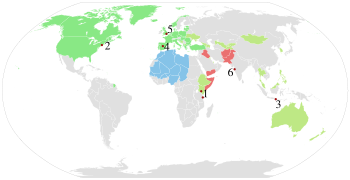
 Other allies involved in major operations
Other allies involved in major operations Major terrorist attacks by Al-Qaeda and affiliated groups: 1. Bali bombings 2002 • 2. September 11 attacks 2001 • 3. Madrid bombings 2004 • 4. London bombings 2005 • 5. Mumbai attacks 2008
Major terrorist attacks by Al-Qaeda and affiliated groups: 1. Bali bombings 2002 • 2. September 11 attacks 2001 • 3. Madrid bombings 2004 • 4. London bombings 2005 • 5. Mumbai attacks 2008The George W. Bush administration defined the following objectives in the War on Terror:[38]
- Defeat terrorists such as Osama bin Laden, Abu Musab al-Zarqawi and destroy their organizations
- Identify, locate and destroy terrorists along with their organizations
- Deny sponsorship, support and sanctuary to terrorists
- End the state sponsorship of terrorism
- Establish and maintain an international standard of accountability with regard to combating terrorism
- Strengthen and sustain the international effort to fight terrorism
- Work with willing and able states
- Enable weak states
- Persuade reluctant states
- Compel unwilling states
- Interdict and disrupt material support for terrorists
- Eliminate terrorist sanctuaries and havens
- Diminish the underlying conditions that terrorists seek to exploit
- Partner with the international community to strengthen weak states and prevent (re)emergence of terrorism
- Win the war of ideals
- Defend US citizens and interests at home and abroad
- Implement the National Strategy for Homeland Security
- Attain domain awareness
- Enhance measures to ensure the integrity, reliability, and availability of critical physical and information-based infrastructures at home and abroad
- Integrate measures to protect US citizens abroad
- Ensure an integrated incident management capability
US and NATO-led military operations
 US Army soldier of the 10th Mountain Division in Nuristan Province, June 2007
US Army soldier of the 10th Mountain Division in Nuristan Province, June 2007
Operation Active Endeavour
Main article: Operation Active EndeavourOperation Active Endeavour is a naval operation of NATO started in October 2001 in response to the September 11 attacks. It operates in the Mediterranean Sea and is designed to prevent the movement of militants or weapons of mass destruction and to enhance the security of shipping in general.[39] The operation has also assisted Greece with its prevention of illegal immigration.
Operation Enduring Freedom
Main article: Operation Enduring FreedomOperation Enduring Freedom is the official name used by the Bush administration for the War in Afghanistan, together with three smaller military actions, under the umbrella of the Global War on Terror. These global operations are intended to seek out and destroy any al-Qaeda fighters or affiliates.
Operation Enduring Freedom – Afghanistan
Main article: War in Afghanistan (2001–present)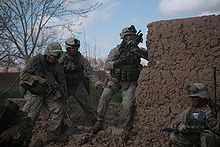 US Marines return fire on enemy forces in Marjeh, February 2010
US Marines return fire on enemy forces in Marjeh, February 2010
On September 20, 2001, in the wake of the September 11 attacks, George W. Bush delivered an ultimatum to the Taliban government of Afghanistan to turn over Osama bin Laden and al-Qaeda leaders operating in the country or face attack.[33] The Taliban demanded evidence of bin Laden's link to the September 11 attacks and, if such evidence warranted a trial, they offered to handle such a trial in an Islamic Court.[40] The US refused to provide any evidence.
Subsequently, in October 2001, US forces (with UK and coalition allies) invaded Afghanistan to oust the Taliban regime. On October 7, 2001, the official invasion began with British and US forces conducting airstrike campaigns over enemy targets. Kabul, the capital city of Afghanistan, fell by mid-November. The remaining al-Qaeda and Taliban remnants fell back to the rugged mountains of eastern Afghanistan, mainly Tora Bora. In December, Coalition forces (the US and its allies) fought within that region. It is believed that Osama bin Laden escaped into Pakistan during the battle.[41][42]
In March 2002, the United States and other NATO and non-NATO forces launched Operation Anaconda with the goal of destroying any remaining al-Qaeda and Taliban forces in the Shah-i-Kot Valley and Arma Mountains of Afghanistan. The Taliban suffered heavy casualties and evacuated the region.[43]
The Taliban regrouped in western Pakistan and began to unleash an insurgent-style offensive against Coalition forces in late 2002.[44] Throughout southern and eastern Afghanistan, firefights broke out between the surging Taliban and Coalition forces. Coalition forces responded with a series of military offensives and an increase in the amount of troops in Afghanistan. In February 2010, Coalition forces launched Operation Moshtarak in southern Afghanistan along with other military offensives in the hopes that they would destroy the Taliban insurgency once and for all.[45] Peace talks are also underway between Taliban affiliated fighters and Coalition forces.
Operation Enduring Freedom – Philippines
Main article: Operation Enduring Freedom - Philippines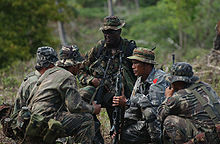 US Special Forces soldier and infantrymen of the Philippine Army
US Special Forces soldier and infantrymen of the Philippine Army
In January 2002, the United States Special Operations Command, Pacific deployed to the Philippines to advise and assist the Armed Forces of the Philippines in combating Filipino Islamist groups.[46] The operations were mainly focused on removing the Abu Sayyaf Group (ASG) and Jemaah Islamiyah (JI) from their stronghold on the island of Basilan.[47] The second portion of the operation was conducted as a humanitarian program called "Operation Smiles." The goal of the program was to provide medical care and services to the region of Basilan as part of a "Hearts and Minds" program.[48][49]
Operation Enduring Freedom – Horn of Africa
Main article: Operation Enduring Freedom - Horn of AfricaSee also: War in Somalia (2006–2009), War in Somalia (2009-), and Piracy in Somalia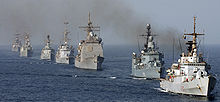 Ships assigned to Combined Task Force One Five Zero (CTF-150)
Ships assigned to Combined Task Force One Five Zero (CTF-150)
This extension of Operation Enduring Freedom was titled OEF-HOA. Unlike other operations contained in Operation Enduring Freedom, OEF-HOA does not have a specific organization as a target. OEF-HOA instead focuses its efforts to disrupt and detect militant activities in the region and to work with willing governments to prevent the reemergence of militant cells and activities.[50]
In October 2002, the Combined Joint Task Force - Horn of Africa (CJTF-HOA) was established in Djibouti at Camp Lemonnier.[51] It contains approximately 2,000 personnel including US military and special operations forces (SOF) and coalition force members, Combined Task Force 150 (CTF-150).
Task Force 150 consists of ships from a shifting group of nations, including Australia, Canada, France, Germany, Italy, Netherlands, Pakistan, New Zealand and the United Kingdom. The primary goal of the coalition forces is to monitor, inspect, board and stop suspected shipments from entering the Horn of Africa region and affecting the US' Operation Iraqi Freedom.
Included in the operation is the training of selected armed forces units of the countries of Djibouti, Kenya and Ethiopia in counter-terrorism and counter-insurgency tactics. Humanitarian efforts conducted by CJTF-HOA include rebuilding of schools and medical clinics and providing medical services to those countries whose forces are being trained.
The program expands as part of the Trans-Saharan Counterterrorism Initiative as CJTF personnel also assist in training the armed forces of Chad, Niger, Mauritania and Mali. However, the War on Terror does not include Sudan, where over 400,000 have died in an ongoing civil war.
On July 1, 2006, a Web-posted message purportedly written by Osama bin Laden urged Somalis to build an Islamic state in the country and warned western governments that the al-Qaeda network would fight against them if they intervened there.[52]
Somalia has been considered a "failed state" because its official central government was weak, dominated by warlords and unable to exert effective control over the country. Beginning in mid-2006, the Islamic Courts Union (ICU), an Islamist faction campaigning on a restoration of "law and order" through Sharia law, had rapidly taken control of much of southern Somalia.
On December 14, 2006, the US Assistant Secretary of State Jendayi Frazer claimed al-Qaeda cell operatives were controlling the Islamic Courts Union, a claim denied by the ICU.[53]
By late 2006, the UN-backed Transitional Federal Government (TFG) of Somalia had seen its power effectively limited to Baidoa, while the Islamic Courts Union controlled the majority of southern Somalia, including the capital of Mogadishu. On December 20, 2006, the Islamic Courts Union launched an offensive on the government stronghold of Baidoa, and saw early gains before Ethiopia intervened in favor of the government.
By December 26, the Islamic Courts Union retreated towards Mogadishu, before again retreating as TFG/Ethiopian troops neared, leaving them to take Mogadishu with no resistance. The ICU then fled to Kismayo, where they fought Ethiopian/TFG forces in the Battle of Jilib.
The Prime Minister of Somalia claimed that three "terror suspects" from the 1998 United States embassy bombings are being sheltered in Kismayo.[54] On December 30, 2006, al-Qaeda deputy leader Ayman al-Zawahiri called upon Muslims worldwide to fight against Ethiopia and the TFG in Somalia.[55]
On January 8, 2007, the US launched the Battle of Ras Kamboni by bombing Ras Kamboni using AC-130 gunships.[56]
On September 14, 2009, US Special Forces killed two men and wounded and captured two others near the Somali village of Baarawe. Witnesses claim that helicopters used for the operation launched from French-flagged warships, but that could not be confirmed. A Somali based al-Qaida affiliated group, the Al-Shabaab, has confirmed the death of "sheik commander" Saleh Ali Saleh Nabhan along with an unspecified number of militants.[57] Nabhan, a Kenyan, was wanted in connection with the 2002 Mombasa attacks.[58]
Operation Enduring Freedom – Trans Sahara
Main article: Operation Enduring Freedom – Trans SaharaOperation Enduring Freedom – Trans Sahara (OEF-TS) is the name of the military operation conducted by the United States and partner nations in the Sahara/Sahel region of Africa, consisting of counter-terrorism efforts and policing of arms and drug trafficking across central Africa.
Iraq
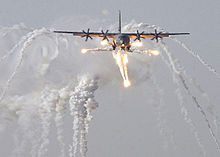 A British C-130J Hercules aircraft launches flare countermeasures prior to being the first coalition aircraft to land on the newly reopened military runway at Baghdad International Airport.
A British C-130J Hercules aircraft launches flare countermeasures prior to being the first coalition aircraft to land on the newly reopened military runway at Baghdad International Airport.
Iraq had been listed as a State sponsor of international terrorism by the United States since 1990,[59] when Saddam Hussein fell out of US favor. The regime of Saddam Hussein proved a continuing problem for the UN and Iraq’s neighbors in its use of chemical weapons against Iranians and Kurds.
Iraqi no-fly zones
After the Gulf War, the US, French and British militaries instituted and began patrolling Iraqi no-fly zones, to protect Iraq's Kurdish minority and Shi'a Arab population—both of which suffered attacks from the Hussein regime before and after the Gulf War—in Iraq's northern and southern regions, respectively. US forces continued in combat zone deployments through November 1995 and launched Operation Desert Fox against Iraq in 1998 after it failed to meet US demands of "unconditional cooperation" in weapons inspections.[60]
Prior to Operation Desert Fox, US president Bill Clinton predicted "And mark my words, he will develop weapons of mass destruction. He will deploy them, and he will use them." Clinton also declared a desire to remove Hussein from power and in the same speech said, "The hard fact is that so long as Saddam remains in power, he threatens the well-being of his people, the peace of his region, the security of the world." In the aftermath of Operation Desert Fox, during December 1998, Iraq announced that it would no longer respect the no-fly zones and resumed its attempts to shoot down US aircraft.
Air strikes by the British and US against Iraqi anti-aircraft and military targets continued over the next few years. Also in 1998, Clinton signed the Iraq Liberation Act, which called for regime change in Iraq on the basis of its alleged possession of weapons of mass destruction, oppression of Iraqi citizens, and attacks on other Middle Eastern countries.
The George W. Bush administration called for the United Nations Security Council (UNSC) to again send weapons inspectors to Iraq to find and destroy the alleged weapons of mass destruction and called for a UNSC resolution.[61] UNSC Resolution 1441 was passed unanimously, which offered Iraq "a final opportunity to comply with its disarmament obligations" or face "serious consequences."
Resolution 1441 did not authorize the use of force by member states. The Iraqi government subsequently allowed UN inspectors some access to Iraqi sites, while the US government continued to assert that Iraq was being obstructionist.[62]
In October 2002, a large bipartisan majority in the United States Congress authorized the president to use force if necessary to disarm Iraq in order to "prosecute the war on terrorism."[63] After failing to overcome opposition from France, Russia, and China against a UNSC resolution that would sanction the use of force against Iraq, and before the UN weapons inspectors had completed their inspections (which were claimed to be fruitless by the US because of Iraq's alleged deception), the United States assembled a "Coalition of the Willing" composed of nations who pledged support for its policy of regime change in Iraq.
Operation Iraqi Freedom
Main article: Iraq WarThe Iraq War began in March 2003 with an air campaign, which was immediately followed by a U.S.-led ground invasion. The Bush administration stated the invasion was the "serious consequences" spoken of in the UNSC Resolution 1441. The Bush administration also stated the Iraq war was part of the War on Terror, something later questioned or contested.
Baghdad, Iraq’s capital city, fell in April 2003 and Saddam Hussein’s government quickly dissolved. On May 1, 2003, Bush announced that major combat operations in Iraq had ended.[64] However, an insurgency arose against the U.S.-led coalition and the newly developing Iraqi military and post-Saddam government. The insurgency, which included al-Qaeda affiliated groups, led to far more coalition casualties than the invasion. Other elements of the insurgency were led by fugitive members of President Hussein's Ba'ath regime, which included Iraqi nationalists and pan-Arabists. Many insurgency leaders are Islamists and claim to be fighting a religious war to reestablish the Islamic Caliphate of centuries past.[65] Iraq’s former president, Saddam Hussein was captured by U.S. forces in December 2003. He was executed in 2006.
In 2004, the insurgent forces grew stronger. The United States conducted attacks on insurgent strongholds in cities like Najaf and Fallujah.
In January 2007, President Bush presented a new strategy for Operation Iraqi Freedom based upon counter-insurgency theories and tactics developed by General David Petraeus. The Iraq War troop surge of 2007 was part of this "new way forward" and, along with US backing of Sunni groups it had previously sought to defeat, has been credited with a widely recognized dramatic decrease in violence by up to 80%.
Operation New Dawn
The war entered a new phase on September 1, 2010,[66] with the official end of US combat operations. However, 50,000 US troops remain in an advise and assist role to provide support for Iraqi security forces.
International military support
Main articles: Participants in Operation Enduring Freedom and Multi-National Force – IraqThe invasion of Afghanistan is seen to have been the first action of this war, and initially involved forces from the United States, the United Kingdom, and the Afghan Northern Alliance. Since the initial invasion period, these forces were augmented by troops and aircraft from Australia, Canada, Denmark, France, Italy, Netherlands, New Zealand and Norway amongst others. In 2006, there were about 33,000 troops in Afghanistan.
On September 12, 2001, less than 24 hours after the September 11 attacks in New York City and Washington, D.C., NATO invoked Article 5 of the North Atlantic Treaty and declared the attacks to be an attack against all 19 NATO member countries. Australian Prime Minister John Howard also declared that Australia would invoke the ANZUS Treaty along similar lines.[67]
In the following months, NATO took a wide range of measures to respond to the threat of terrorism. On November 22, 2002, the member states of the Euro-Atlantic Partnership Council (EAPC) decided on a Partnership Action Plan against Terrorism which explicitly states that "EAPC States are committed to the protection and promotion of fundamental freedoms and human rights, as well as the rule of law, in combating terrorism."[68] NATO started naval operations in the Mediterranean Sea designed to prevent the movement of terrorists or weapons of mass destruction as well as to enhance the security of shipping in general called Operation Active Endeavour.
Support for the United States cooled when America made clear its determination to invade Iraq in late 2002. Even so, many of the "coalition of the willing" countries that unconditionally supported the US-led military action have sent troops to Afghanistan, particular neighboring Pakistan, which has disowned its earlier support for the Taliban and contributed tens of thousands of soldiers to the conflict. Pakistan was also engaged in the War in North-West Pakistan (Waziristan War). Supported by US intelligence, Pakistan was attempting to remove the Taliban insurgency and al-Qaeda element from the northern tribal areas.[69]
International Security Assistance Force
-
Main article: International Security Assistance Force
December 2001 saw the creation of the NATO-led International Security Assistance Force (ISAF) to assist the Afghan Transitional Administration and the first post-Taliban elected government. With a renewed Taliban insurgency, it was announced in 2006 that ISAF would replace the US troops in the province as part of Operation Enduring Freedom.
The British 16th Air Assault Brigade (later reinforced by Royal Marines) formed the core of the force in southern Afghanistan, along with troops and helicopters from Australia, Canada and the Netherlands. The initial force consisted of roughly 3,300 British, 2,000 Canadian, 1,400 from the Netherlands and 240 from Australia, along with special forces from Denmark and Estonia and small contingents from other nations. The monthly supply of cargo containers through Pakistani route to ISAF in Afghanistan is over 4,000 costing around 12 billion in Pakistani Rupees.[70][71][72][73][74]
Fighting in Pakistan
Main article: Pakistan's role in the War on TerrorSee also: Pakistan and state terrorism and War in North-West PakistanFollowing the September 11, 2001 attacks, former President of Pakistan Pervez Musharraf sided with the United States against the Taliban government in Afghanistan after an ultimatum by US President George W. Bush. Musharraf agreed to give the United States the use of three airbases for Operation Enduring Freedom. United States Secretary of State Colin Powell and other administration officials met with Musharraf. On September 19, 2001, Musharraf addressed the people of Pakistan and stated that, while he opposed military tactics against the Taliban, Pakistan risked being endangered by an alliance of India and the US if it did not cooperate. In 2006, Musharraf testified that this stance was pressured by threats from the US, and revealed in his memoirs that he had "war-gamed" the United States as an adversary and decided that it would end in a loss for Pakistan.[75]
On January 12, 2002, Musharraf gave a speech against Islamic extremism. He unequivocally condemned all acts of terrorism and pledged to combat Islamic extremism and lawlessness within Pakistan itself. He stated that his government was committed to rooting out extremism and made it clear that the banned militant organizations would not be allowed to resurface under any new name. He said, "the recent decision to ban extremist groups promoting militancy was taken in the national interest after thorough consultations. It was not taken under any foreign influence".[76]
In 2002, the Musharraf-led government took a firm stand against the jihadi organizations and groups promoting extremism, and arrested Maulana Masood Azhar, head of the Jaish-e-Mohammed, and Hafiz Muhammad Saeed, chief of the Lashkar-e-Taiba, and took dozens of activists into custody. An official ban was imposed on the groups on January 12.[77] Later that year, the Saudi born Zayn al-Abidn Muhammed Hasayn Abu Zubaydah was arrested by Pakistani officials during a series of joint US-Pakistan raids. Zubaydah is said to have been a high-ranking al-Qaeda official with the title of operations chief and in charge of running al-Qaeda training camps.[78] Other prominent al-Qaeda members were arrested in the following two years, namely Ramzi bin al-Shibh, who is known to have been a financial backer of al-Qaeda operations, and Khalid Sheikh Mohammed, who at the time of his capture was the third highest ranking official in al-Qaeda and had been directly in charge of the planning for the September 11 attacks.
In 2004, the Pakistan Army launched a campaign in the Federally Administered Tribal Areas of Pakistan's Waziristan region, sending in 80,000 troops. The goal of the conflict was to remove the al-Qaeda and Taliban forces in the region.
After the fall of the Taliban regime many members of the Taliban resistance fled to the Northern border region of Afghanistan and Pakistan where the Pakistani army had previously little control. With the logistics and air support of the United States, the Pakistani Army captured or killed numerous al-Qaeda operatives such as Khalid Sheikh Mohammed, wanted for his involvement in the USS Cole bombing, the Bojinka plot, and the killing of Wall Street Journal reporter Daniel Pearl.
The United States has carried out a campaign of Drone attacks on targets all over the Federally Administered Tribal Areas. However, the Pakistani Taliban resistance still operates there. To this day it’s estimated that 15 US soldiers were killed while fighting al-Qaeda and Taliban remnants in Pakistan since the War on Terror began.[79]
Osama bin Laden, the founder of al-Qaeda, was killed on May 2, 2011, during a raid conducted by the United States special operations forces in Abbottabad, Pakistan.[80]
Islamic terrorism after 9/11
Since 9/11, al-Qaeda and other radical Islamic groups have successfully executed major attacks in several parts of the world.
- 2002 Bali bombings in Indonesia
- 6 December 2002 Mumbai bus bombing and 28 July 2003 Mumbai bus bombing in India
- 27 January 2003 Mumbai bombing and 25 August 2003 Mumbai bombings in India
- Mike's Place suicide bombing in Israel
- 2003 Casablanca bombings and 2007 Casablanca bombings in Morocco
- 2003 Istanbul bombings in Turkey
- February 2004 Moscow metro bombing and 2010 Moscow Metro bombings in Russia
- 2004 Madrid train bombings in Spain
- August 2004 Moscow metro bombing in Russia
- 7 July 2005 London bombings and 2007 Glasgow International Airport attack in the United Kingdom
- 11 July 2006 Mumbai train bombings and 13 March 2003 Mumbai train bombing in India
- 11 April 2007 Algiers bombings in Algeria
- 2007 Karachi bombing of Benazir Bhutto's motorcade and Islamabad Marriott Hotel bombing in Pakistan
- 2008 Mumbai Terrorist Attacks in India and 2011 Mumbai bombings
- 2009 Attack on the Sri Lankan Cricket Team in Pakistan
- 2009 Fort Hood shooting
- Domodedovo International Airport bombing in Russia
- 2011 Alexandria bombing and 2011 Imbaba church attacks in Egypt
- Itamar attack in West Bank
- Hamas school bus attack and 2011 Jerusalem bus stop bombing in Israel
- List of Palestinian rocket attacks on Israel, 2011 in Israel
- 2011 Cirebon bombing in Indonesia
- 2011 Marrakech bombing in Morocco
- 2011 Abuja police headquarters bombing and May 2011 northern Nigeria bombings in Nigeria
- 25 June 2011 Logar province bombing in Afghanistan
- 30 June 2011 Nimruz province bombing in Afghanistan
- 2 July 2011 Zabul province bombing in Afghanistan
- 2011 Charsadda bombing, 2011 Faisalabad bombing, 2011 Dera Ghazi Khan bombings, July 2011 Karachi target killings, June 2011 Peshawar bombings, March 2011 Peshawar bombing, PNS Mehran attack, in Pakistan
- 21 June 2011 Al Diwaniyah bombing, 24 January 2011 Iraq bombings, 27 January 2011 Baghdad bombing, January 2011 Baghdad shootings, January 2011 Iraq suicide attacks, 5 July 2011 Taji bombings in Iraq
- 2011 Minsk Metro bombing in Belarus
In addition, there have been several planned terrorist attacks that were not successful.
- 2004 financial buildings plot
- 21 July 2005 London bombings and 2007 London car bombs
- 2006 Toronto terrorism plot
- 2006 transatlantic aircraft plot involving liquid explosives carried onto commercial airplanes
- Hudson River bomb plot
- 2007 Fort Dix attack plot
- 2007 John F. Kennedy International Airport attack plot
- 2009 Bronx terrorism plot
- 2009 New York Subway and United Kingdom Plot
- 2009 Christmas Bomb Plot
- 2010 Times Square car bombing attempt
- 2010 cargo plane bomb plot
- 2010 Portland car bomb plot
- 2011 Dearborn mosque bombing plot
- 2011 Manhattan terrorism plot
U.S. Military aid to other countries
- Pakistan
In the three years before the attacks of September 11, Pakistan received approximately $9 million in American military aid. In the three years after, the number increased to $4.2 billion, making it the country with the maximum funding post 9/11.
Such a huge inflow of funds has raised concerns in the Indian press that these funds were given without any accountability, as the end uses not being documented, and that large portions were used to suppress civilians' human rights and to purchase weapons to contain domestic problems like the Balochistan unrest. Pakistan has stated that India has been supporting terror groups within the Federally Administered Tribal Areas and Balochistan with the aim of creating unrest within the country.[81]
- Lebanon
See also: 2007 Lebanon conflictOn May 20, 2007, a conflict began in north Lebanon after fighting broke out between Fatah al-Islam, an Islamist militant organization, and the Lebanese Armed Forces in Nahr al-Bared, a Palestinian refugee camp near Tripoli. The conflict evolved mostly around the Siege of Nahr el-Bared, but minor clashes also occurred in the Ain al-Hilweh refugee camp in southern Lebanon and several bombings took place in and around Lebanon's capital, Beirut.
Fatah-al-Islam has been described as a militant mujahid[82] movement that draws inspiration from al-Qaeda.[82] The US provided military aid to the Lebanese government during the conflict. On September 7, 2007, Lebanese government forces captured the camp and declared victory.
- Yemen
See also: Terrorism in Yemen and Yemeni al-Qaeda crackdownThe United States has also conducted a series of military strikes on al-Qaeda militants in Yemen since the War on Terror began.[83] Yemen has a weak central government and a powerful tribal system that leaves large lawless areas open for militant training and operations. Al-Qaida has a strong presence in the country.[84]
The US, in an effort to support Yemeni counter-terrorism efforts, has increased their military aid package to Yemen from less than $11 million in 2006 to more than $70 million in 2009, as well as providing up to $121 million for development over the next three years.[85]
Post 9/11 events inside the United States
Further information: Detentions following the September 11, 2001 Terrorist Attack and Aftermath of the September 11 attacksIn addition to military efforts abroad, in the aftermath of 9/11 the Bush Administration increased domestic efforts to prevent future attacks. Various government bureaucracies which handled security and military functions were reorganized. A new cabinet level agency called the United States Department of Homeland Security was created in November 2002 to lead and coordinate the largest reorganization of the US federal government since the consolidation of the armed forces into the Department of Defense.[citation needed]
The Justice Department launched a Special Registration procedure for certain male non-citizens in the US, requiring them to register in person at offices of the Immigration and Naturalization Service.
Main article: USA PATRIOT ActThe USA PATRIOT Act of October 2001 dramatically reduces restrictions on law enforcement agencies' ability to search telephone, e-mail communications, medical, financial, and other records; eases restrictions on foreign intelligence gathering within the United States; expands the Secretary of the Treasury’s authority to regulate financial transactions, particularly those involving foreign individuals and entities; and broadens the discretion of law enforcement and immigration authorities in detaining and deporting immigrants suspected of terrorism-related acts. The act also expanded the definition of terrorism to include domestic terrorism, thus enlarging the number of activities to which the USA PATRIOT Act's expanded law enforcement powers could be applied. A new Terrorist Finance Tracking Program monitored the movements of terrorists' financial resources (discontinued after being revealed by The New York Times newspaper). Telecommunication usage by known and suspected terrorists was studied through the NSA electronic surveillance program. The Patriot Act is still in effect.
Political interest groups have stated that these laws remove important restrictions on governmental authority, and are a dangerous encroachment on civil liberties, possible unconstitutional violations of the Fourth Amendment. On July 30, 2003, the American Civil Liberties Union (ACLU) filed the first legal challenge against Section 215 of the Patriot Act, claiming that it allows the FBI to violate a citizen's First Amendment rights, Fourth Amendment rights, and right to due process, by granting the government the right to search a person's business, bookstore, and library records in a terrorist investigation, without disclosing to the individual that records were being searched.[86] Also, governing bodies in a number of communities have passed symbolic resolutions against the act.
In a speech on June 9, 2005, Bush said that the USA PATRIOT Act had been used to bring charges against more than 400 suspects, more than half of whom had been convicted. Meanwhile the ACLU quoted Justice Department figures showing that 7,000 people have complained of abuse of the Act.
The Defense Advanced Research Projects Agency (DARPA) began an initiative in early 2002 with the creation of the Total Information Awareness program, designed to promote information technologies that could be used in counter-terrorism. This program, facing criticism, has since been defunded by Congress.
By 2003, 12 major conventions and protocols were designed to combat terrorism. These were adopted and ratified by a number of states. These conventions require states to co-operate on principal issues regarding unlawful seizure of aircraft, the physical protection of nuclear materials, and the freezing of assets of militant networks.[87]
In 2005 the UN Security Council adopted Resolution 1624 concerning incitement to commit acts of terrorism and the obligations of countries to comply with international human rights laws.[88] Although both resolutions require mandatory annual reports on counter-terrorism activities by adopting nations, the United States and Israel have both declined to submit reports. In the same year, the United States Department of Defense and the Chairman of the Joint Chiefs of Staff issued a planning document, by the name "National Military Strategic Plan for the War on Terrorism" which stated that it constituted the "comprehensive military plan to prosecute the Global War on Terror for the Armed Forces of the United States...including the findings and recommendations of the 9/11 Commission and a rigorous examination with the Department of Defense".
On January 9, 2007, the House of Representatives passed a bill, by a vote of 299–128, enacting many of the recommendations of the 9/11 Commission The bill passed in the US Senate,[89] by a vote of 60–38, on March 13, 2007 and it was signed into law on August 3, 2007 by President Bush. It became Public Law 110-53.
The Office of Strategic Influence was secretly created after 9/11 for the purpose of coordinating propaganda efforts, but was closed soon after being discovered. The Bush administration implemented the Continuity of Operations Plan (or Continuity of Government) to ensure that US government would be able to continue in catastrophic circumstances.
Since 9/11, extremists made various attempts to attack the US homeland, with varying levels of organization and skill. For example, vigilant passengers aboard a transatlantic flight prevented Richard Reid, in 2001, and Umar Farouk Abdulmutallab, in 2009, from detonating an explosive device.
Other terrorist plots have been stopped by federal agencies using new legal powers and investigative tools, sometimes in cooperation with foreign governments.
Such thwarted attacks include:
- The 2001 shoe bomb plot
- A plan to crash airplanes into the US Bank Tower (aka Library Tower) in Los Angeles
- The 2003 plot by Iyman Faris to blow up the Brooklyn Bridge in New York City
- The 2004 Financial buildings plot which targeted the International Monetary Fund and World Bank buildings in Washington, DC, the New York Stock Exchange and other financial institutions
- The 2004 Columbus Shopping Mall Bombing Plot
- The 2006 Sears Tower plot
- The 2007 Fort Dix attack plot
- The 2007 John F. Kennedy International Airport attack plot
- The New York Subway Bombing Plot and 2010 Times Square car bombing attempt
The Obama administration has promised the closing of the Guantanamo Bay detention camp, increased the number of troops in Afghanistan, and promised the withdrawal of its troops from Iraq.
Casualties
Further information: List of terrorist incidents, 2001 to List of terrorist incidents, 2011The Global War of Terror has seen fewer war deaths than any other decade in the past century.[90]
There is no widely agreed on figure for the number of people that have been killed so far in the War on Terror as it has been defined by the Bush Administration to include the war in Afghanistan, the war in Iraq, and operations elsewhere. Some estimates include the following:
- Iraq: 62,570 to 1,124,000
Main article: Casualties of the Iraq War-
- Opinion Research Business (ORB) poll conducted August 12–19, 2007 estimated 1,033,000 violent deaths due to the Iraq War. The range given was 946,000 to 1,120,000 deaths. A nationally representative sample of approximately 2,000 Iraqi adults answered whether any members of their household (living under their roof) were killed due to the Iraq War. 22% of the respondents had lost one or more household members. ORB reported that "48% died from a gunshot wound, 20% from the impact of a car bomb, 9% from aerial bombardment, 6% as a result of an accident and 6% from another blast/ordnance."[91][92][93][94]
- Between 392,979 and 942,636 estimated Iraqi (655,000 with a confidence interval of 95%), civilian and combatant, according to the second Lancet survey of mortality.
- A minimum of 62,570 civilian deaths reported in the mass media up to 28 April 2007 according to Iraq Body Count project.[95]
- 4410 US military dead. 31,844 wounded in action, of which 13,954 were unable to return to duty within 72 hours.[96]
- Afghanistan: between 10,960 and 49,600
-
- According to Marc W. Herold's extensive database,[97] between 3,100 and 3,600 civilians were directly killed by US Operation Enduring Freedom bombing and Special Forces attacks between October 7, 2001 and June 3, 2003. This estimate counts only "impact deaths"—deaths that occurred in the immediate aftermath of an explosion or shooting—and does not count deaths that occurred later as a result of injuries sustained, or deaths that occurred as an indirect consequence of the US airstrikes and invasion.
-
- In an opinion article published in August 2002 in the magazine The Weekly Standard, Joshua Muravchik of the American Enterprise Institute,[98] questioned Professor Herold's study entirely on the basis of one single incident that involved 25–93 deaths. He did not provide any estimate his own.[99]
-
- In a pair of January 2002 studies, Carl Conetta of the Project on Defense Alternatives estimates that "at least" 4,200–4,500 civilians were killed by mid-January 2002 as a result of the US war and airstrikes, both directly as casualties of the aerial bombing campaign, and indirectly in the resulting humanitarian crisis.
-
- His first study, "Operation Enduring Freedom: Why a Higher Rate of Civilian Bombing Casualties?",[100] released January 18, 2002, estimates that, at the low end, "at least" 1,000–1,300 civilians were directly killed in the aerial bombing campaign in just the 3 months between October 7, 2001 to January 1, 2002. The author found it impossible to provide an upper-end estimate to direct civilian casualties from the Operation Enduring Freedom bombing campaign that he noted as having an increased use of cluster bombs.[101] In this lower-end estimate, only Western press sources were used for hard numbers, while heavy "reduction factors" were applied to Afghan government reports so that their estimates were reduced by as much as 75%.[102]
-
- In his companion study, "Strange Victory: A critical appraisal of Operation Enduring Freedom and the Afghanistan war",[103] released January 30, 2002, Conetta estimates that "at least" 3,200 more Afghans died by mid-January 2002, of "starvation, exposure, associated illnesses, or injury sustained while in flight from war zones", as a result of the US war and airstrikes.
-
- In similar numbers, a Los Angeles Times review of US, British, and Pakistani newspapers and international wire services found that between 1,067 and 1,201 direct civilian deaths were reported by those news organizations during the five months from October 7, 2001 to February 28, 2002. This review excluded all civilian deaths in Afghanistan that did not get reported by US, British, or Pakistani news, excluded 497 deaths that did get reported in US, British, and Pakistani news but that were not specifically identified as civilian or military, and excluded 754 civilian deaths that were reported by the Taliban but not independently confirmed.[104]
-
- According to Jonathan Steele of The Guardian between 20,000 and 49,600 people may have died of the consequences of the invasion by the spring of 2002.[105]
- Pakistan: between 1467 and 2334 killed in U.S. drone attacks as of May 6, 2011
Main article: Drone attacks in PakistanMain article: Terrorism in Pakistan- Yemen
Main article: Terrorism in Yemen- Germany
Main article: 2011 Frankfurt Airport shooting-
- Two Airmen were killed, another two were wounded at Frankfurt Airport by Arid Uka; they were en route to deployment to Afghanistan.[106]
- Somalia: 7,000+
- USA
-
- Two radicals, John Allen Muhammad and Lee Boyd Malvo, conducted sniper attacks in Washington, D.C., Maryland, and Virginia in October 2002. Ten people were killed and three others were critically wounded in those shootings.[108]
- June 1, 2009, Pvt. William Andrew Long was shot and killed by Abdulhakim Muhammad, while standing unarmed outside a recruiting facility in Little Rock AR.[109][110]
- On November 5, 2009, Nidal Malik Hasan, an Islamic extremist, shot and killed 13 people and wounded 30 others in Fort Hood, Texas.[111]
Total American casualties from the War on Terror
(this includes fighting throughout the world):US Military killed 5,921[112] US Military wounded 42,673[112] US Civilians killed (includes 9/11 and after) 3,000 + US Civilians wounded/injured 6,000 + Total Americans killed (military and civilian) 8,800 + Total Americans wounded/injured 46,000 + Total American casualties 54,800 + Costs
A March 2011 Congressional Research Service report, “The Cost of Iraq, Afghanistan, and Other Global War on Terror Operations Since 9/11," analyzed the financial outlays that have been made for the conflicts during this nearly decade-long period. The report focuses on expenditures related to Operation Enduring Freedom (OEF) Afghanistan and other counter terror operations; Operation Noble Eagle (ONE), providing enhanced security at military bases; and Operation Iraqi Freedom (OIF). The report’s total does not include supplementary economic, food and military aid to Pakistan or assistance to several countries in Africa. The report states that the price tag through fiscal year 2011 for such purposes as military operations, base security, reconstruction, foreign aid, embassy costs, and veterans’ health care will be $1.283 trillion. If the fiscal year budget for 2012 is approved, the total global security and conflict-related costs will be $1.415 trillion. If deployed troop levels come down to 45,000 by 2015 and stay there through 2021, the total two-decade cost is estimated to be $1.8 trillion.[118]
Criticism
Main article: Criticism of the War on TerrorThe notion of a "war" against "terror" or "terrorism" has proven highly contentious, with critics charging that it has been exploited by participating governments to pursue long-standing policy objectives, reduce civil liberties, and infringe upon human rights. Some argue that the term war is not appropriate in this context, since they believe there is no identifiable enemy, and that it is unlikely international terrorism can be brought to an end by military means.[119] The Director of Public Prosecutions and head of the Crown Prosecution Service in the United Kingdom, Ken McDonald has stated that those responsible for acts of terror such as the 7 July 2005 London bombings are not "soldiers" in a war, but "inadequates" who should be dealt with by the criminal justice system.[120] Other critics, such as Francis Fukuyama, note that "terrorism" is not an enemy but a tactic; calling it a "war on terror" obscures differences between conflicts.
The term terrorism has been characterized as unacceptably vague. The United Nations Office on Drugs and Crime stated that there is lack of agreement on a definition of terrorism and that has proven to be an obstacle to meaningful international countermeasures. It proceeds to declare that "Some have often commented that one state's 'terrorist' is another state's 'freedom fighter'". Governments in Iran, Lebanon, and Venezuela consistently use the term "terrorism" to describe actions taken by the United States.[121] The use of state terrorism by the US and the inherent hypocrisy of the term have been commented upon by Americans as well, including 3 star general William Odom, formerly President Reagan's NSA Director, who wrote:
"As many critics have pointed out, terrorism is not an enemy. It is a tactic. Because the United States itself has a long record of supporting terrorists and using terrorist tactics, the slogans of today's war on terrorism merely makes the United States look hypocritical to the rest of the world. A prudent American president would end the present policy of "sustained hysteria" over potential terrorist attacks..treat terrorism as a serious but not a strategic problem, encourage Americans to regain their confidence, and refuse to let al Qaeda keep us in a state of fright."[122][123]
Further criticism maintains that the War on Terror provides a framework for perpetual war; the announcement of such open-ended goals produces a state of endless conflict, since "terrorist groups" can continue to arise indefinitely.[124] George W. Bush pledged that the War on Terror "will not end until every terrorist group of global reach has been found, stopped, and defeated".[125] During a July 2007 visit to the United States, newly appointed British Prime Minister Gordon Brown defined the War on Terror, specifically the element involving conflict with al-Qaeda, as "a generational battle".[126]
The War on Terror has been criticized as inefficient, with a number of security experts, politicians, and policy organizations having claimed that the War on Terror has been counterproductive, that it has consolidated opposition to the US, aided terrorist recruitment, and increased the likelihood of attacks against the US and its allies. In a 2005 briefing paper, the Oxford Research Group reported that "Al-Qaida and its affiliates remain active and effective, with a stronger support base and a higher intensity of attacks than before 9/11. ...Far from winning the 'war on terror', the second George W. Bush administration is maintaining policies that are not curbing paramilitary movements and are actually increasing violent anti-Americanism." On September 19, 2008, the RAND Corporation presented the results of a comprehensive study for "Defeating Terrorist Groups" before the United States House Armed Services Committees, which said that "by far the most effective strategy against religious groups has been the use of local police and intelligence services, which were responsible for the end of 73 percent of [terrorist] groups since 1968."[127] The RAND Corporation recommended "[The US military] should generally resist being drawn into combat operations in Muslim countries where its presence is likely to increase terrorist recruitment." They stated that "moving away from military references would indicate that there was no battlefield solution to countering terrorism."
Others have criticized the US for double standards in its dealings with key allies that are also known to support terrorist groups, such as Pakistan. Afghan President Hamid Karzai has repeatedly stated that in the "war against terrorism," “the central front is Pakistan"; Pakistan has also been alleged to provide Taliban operatives with covert support via the ISI.[128] These accusations of double dealing apply to civil liberties[129] and human rights as well as terrorism. According to the Federation of American Scientists, "[i]n its haste to strengthen the "frontline" states' ability to confront transnational terrorist threats on their soil, and to gain the cooperation of regimes of geostrategic significance to the next phases of the "War on Terrorism", the administration is disregarding normative restrictions on US aid to human rights abusers."[130] Amnesty International has argued that the Patriot Act gives the US government free rein to violate the constitutional rights of citizens.[131] The Bush administration's use of torture and alleged use of extraordinary rendition and secret prisons have all fueled opposition to the War on Terror.[132][133][134][135]
According to a sample survey conducted by the Pew Research Center, international support of the War on Terror has also faced a substantial decline, both in public opinion and by foreign state officials. In 2002, strong majorities supported the US-led War on Terror in Britain, France, Germany, Japan, India, and Russia. By 2006, supporters of the effort were in the minority in Britain (49%), France (43%), Germany (47%), and Japan (26%). Although a majority of Russians still supported the War on Terror, that majority had decreased by 21%. Whereas 63% of the Spanish population supported the War on Terror in 2003, only 19% of the population indicated support in 2006. 19% of the Chinese population supports the War on Terror, and less than a fifth of the populations of Turkey, Egypt, and Jordan support the effort. The report of the Pew Research Center also indicates that the Indian public support for the War on Terror has been stable.[136] Andrew Kohut, speaking to the U.S. House Committee on Foreign Affairs, noted that, according to the Pew Research Center polls conducted in 2004, "majorities or pluralities in seven of the nine countries surveyed said the US-led war on terror was not really a sincere effort to reduce international terrorism. This was true not only in Muslim countries such as Morocco and Turkey, but in France and Germany as well. The true purpose of the war on terror, according to the people surveyed, is American control of Middle East oil and US domination of the world."[137]
Stella Rimington, former head of the British intelligence service MI5, has criticized the war on terror as a "huge overreaction", and had decried the militarization and politicization of the US efforts as being the wrong approach to terrorism.[138] In January 2009, the British Foreign Secretary, David Miliband, wrote that "ultimately, the notion is misleading and mistaken" and later said "Historians will judge whether [the notion] has done more harm than good".[139][140][141]
Role of US media
Main article: Role of U.S. media on the War on TerrorResearchers in the area of communication studies and political science have found that American understanding of the war on terror is directly shaped by how the mainstream news media reports events associated with the war on terror. In Bush’s War: Media Bias and Justifications for War in a Terrorist Age[142] political communication researcher Jim A. Kuypers illustrated "how the press failed America in its coverage on the War on Terror." In each comparison, Kuypers "detected massive bias on the part of the press." The researcher called the mainstream news media an "anti-democratic institution" in his conclusion. The findings of the research suggest that the public is misinformed about government justification and plans concerning the war on terror.
Others have also suggested that press coverage has contributed to a public confused and misinformed on both the nature and level of the threat to the US posed by terrorism. In his book Trapped in the War on Terror[143] political scientist Ian S. Lustick states "the media have given constant attention to possible terrorist-initiated catastrophes and to the failures and weaknesses of the government's response." Lustick alleged that the War on Terror is disconnected from the real but remote threat terrorism poses, and that the generalized War on Terror began as part of the justification for invading Iraq, but then took on a life of its own, fueled by media coverage.
Media researcher Stephen D. Cooper’s analysis of media criticism Watching the Watchdog: Bloggers As the Fifth Estate[144] contains many examples of controversies concerning mainstream reporting of the War on Terror. Cooper found that bloggers' criticisms of factual inaccuracies in news stories or bloggers’ discovery of the mainstream press's failure to adequately check facts before publication caused many news organizations to retract or change news stories.
David Barstow won the 2009 Pulitzer Prize for Investigative Reporting by connecting the Department of Defense to over 75 retired generals supporting the Iraq War on TV and radio networks. The Department of Defense recruited the retired generals to sell the war to the American public. Barstow also discovered undisclosed links between some retired generals and defense contractors. Barstow reported "the Bush administration used its control over access of information in an effort to transform the analysts into a kind of media Trojan horse."
See also
- Axis of evil
- Black sites (CIA secret detention centers)
- Bush Doctrine
- Foreign policy of the United States
- Pakistan – United States relations
- State Sponsors of Terrorism
- Timeline of United States military operations
- Targeted killing
References
- ^ ETA "Presidential Address to the Nation" (Press release). The White House (Clockwise, starting at top left:Burning ruins of the World Trade Center, US soldiers board a Chinook helicopter during Operation Anaconda, an Afghan and US soldier stand by to engage an enemy, a car bomb detonates in Baghdad, Iraq. September 11, 2001. http://georgewbush-whitehouse.archives.gov/news/releases/2001/10/print/20011007-8.html.
- ^ Cooley, John K. (Spring 2003). "Unholy Wars: Afghanistan, America and International Terrorism" (reprint). Demokratizatsiya. http://findarticles.com/p/articles/mi_qa3996/is_200304/ai_n9199132.
- ^ Megan K. Stack (December 6, 2001). "Fighters Hunt Former Ally". articles.latimes.com. http://articles.latimes.com/2001/dec/06/news/mn-12224. Retrieved May 2, 2010.
- ^ "Al Qaeda's Fatwa". PBS Newshour. 23 February 1998. http://www.pbs.org/newshour/terrorism/international/fatwa_1998.html. Retrieved 10 September 2011.
- ^ J. T. Caruso (8 December 2001). "Al-Qaeda International". Federal Bureau of Investigation. United States Department of Justice. http://www.fbi.gov/news/testimony/al-qaeda-international. Retrieved 10 September 2011.
- ^ Nic Robertson (19 August 2002). "Previously unseen tape shows bin Laden's declaration of war". CNN. http://articles.cnn.com/2002-08-19/us/terror.tape.main_1_bin-international-islamic-front-osama?_s=PM:US. Retrieved 10 September 2011.
- ^ Lisa Myers (17 March 2004). "Osama bin Laden: missed opportunities". NBC. http://www.msnbc.msn.com/id/4540958/ns/nightly_news/t/osama-bin-laden-missed-opportunities/. Retrieved 10 September 2011.
- ^ "Report of the Accountability Review Boards". US Department of State. August 7, 1998. http://www.state.gov/www/regions/africa/board_introduction.html.
- ^ "U.S. strikes terrorist targets in Afghanistan, Sudan". CNN. August 20, 1998. http://www.cnn.com/US/9808/20/clinton.02/index.html?eref=sitesearch.
- ^ "U.S. retaliates for Africa bombings". CNN. August 20, 1998. http://www.cnn.com/US/9808/20/clinton.01/index.html?eref=sitesearch.
- ^ a b Malcolm Clark. "Bad air and rank hypocrisy". www.newstatesman.com. http://www.newstatesman.com/200003200023. Retrieved May 2, 2010.
- ^ Stevel Lee Myers and Tim Weiner (August 27, 1998). "Possible Benign Use Is Seen for Chemical at Factory in Sudan". partners.nytimes.com. http://partners.nytimes.com/library/world/africa/082798attack-us.html. Retrieved May 2, 2010.
- ^ "What proof of bin Laden's involvement". CNN. September 13, 2001. http://cnn.com/2001/US/09/13/binladen.evidence/index.html?eref=sitesearch.
- ^ "Bush likens 'war on terror' to WWIII". ABC News Online – Abc.net.au. 06/05/2006. http://www.abc.net.au/news/newsitems/200605/s1632213.htm. Retrieved 2011-03-26.
- ^ Thomas L. Friedman (13 September 2009). "Foreign Affairs; World War III". New York Times. http://www.nytimes.com/2001/09/13/opinion/foreign-affairs-world-war-iii.html?sec=&spon=&pagewanted=all. Retrieved 10 November 2009.
- ^ "World War II Strikes Spain". New York: NYDailyNews.com. 12 March 2004. http://www.nydailynews.com/archives/opinions/2004/03/12/2004-03-12_world_war_iii_strikes_spain.html. Retrieved 10 November 2009.
- ^ Charles Feldman and Stan Wilson (3 April 2003). "Ex-CIA director: U.S. faces 'World War IV'". CNN. http://www.cnn.com/2003/US/04/03/sprj.irq.woolsey.world.war/.
- ^ Coman, Julian (April 13, 2003). "'We want them to be nervous' (That means you Ali, Bashar and Kim)". London: telegraph.co.uk. http://www.telegraph.co.uk/news/worldnews/middleeast/syria/1427428/We-want-them-to-be-nervous-That-means-you-Ali-Bashar-and-Kim.html. Retrieved 9 November 2009.
- ^ Elio A. Cohen (20 November 2001). "World War IV". The Wall Street Journal. http://www.opinionjournal.com/editorial/feature.html?id=95001493. Retrieved 9 November 2009.
- ^ Thompson, Mark (2008-12-26). "The $1 Trillion Bill for Bush's War on Terror". TIME. http://www.time.com/time/nation/article/0,8599,1868367,00.html. Retrieved 2011-03-26.
- ^ Priest, Dana (23 January 2009). "Bush's 'War' On Terror Comes to a Sudden End". washingtonpost.com. http://www.washingtonpost.com/wp-dyn/content/article/2009/01/22/AR2009012203929.html. Retrieved 2011-03-26.
- ^ "Bush's War On Terror Shifting Targets". CBS News. 2008-01-28. http://www.cbsnews.com/stories/2008/01/28/terror/main3757858.shtml. Retrieved 2011-03-26.
- ^ [1]
- ^ "Abizaid Credited With Popularizing the Term 'Long War'", 3 February 2006: Washington Post traces history of the phrase "Long War" [2]
- ^ "Joint Forces Intelligence Command."
- ^ "Eric L. Bradley, Deputy Commander"
- ^ "Compensation Package for Bomb Bast Victims."
- ^ http://www.cnsnews.com/node/59446
- ^ http://articles.sfgate.com/2007-02-20/opinion/17233057_1_al-qaeda-terror-promotion-of-human-rights
- ^ Silver, Alexandra (2010-03-18). "How America Became a Surveillance State". Time Magazine - Time.com. http://www.time.com/time/nation/article/0,8599,1973131,00.html. Retrieved 2011-03-26.
- ^ "Kenneth R. Bazinet, "A Fight Vs. Evil, Bush And Cabinet Tell U.S."". New York: Nydailynews.com. 2001-09-17. http://www.nydailynews.com/archives/news/2001/09/17/2001-09-17_a_fight_vs__evil__bush_and_c.html. Retrieved 2011-03-26.
- ^ Jonathan Lyons, "Bush enters Mideast's rhetorical minefield" (Reuters: September 21, 2001). Greenspun.com
- ^ a b "Transcript of President Bush's address". CNN. 2001-09-20. http://www.cnn.com/2001/US/09/20/gen.bush.transcript/.
- ^ "FULL TRANSCRIPT: President Barack Obama's Inaugural Address". Abcnews.go.com. 2009-01-20. http://abcnews.go.com/Politics/Inauguration/story?id=6689022&page=1. Retrieved 2011-03-26.
- ^ a b 'Global War On Terror' Is Given New Name, Scott Wilson and Al Kamen, The Washington Post, March 25, 2009; Page A04
- ^ Borhan Uddin Khan and Muhammad Mahbubur Rahman, “Combating Terrorism under Human Rights and Humanitarian Law Regime”, Mediterranean Journal of Human Rights, Vol. 12 (Double Issue), 2008, pp.379–397.
- ^ "Civil Rights and the "War on Terror"". www.amnestyusa.org. http://www.amnestyusa.org/war-on-terror/civil-rights/page.do?id=1108209. Retrieved May 2, 2010.
- ^ President Bush Releases National Strategy for Combating Terrorism, February 14, 2003, The White House
- ^ "Operation Active Endeavour". NATO. 10 November 2010. http://www.nato.int/cps/en/natolive/topics_7932.htm. Retrieved 19 January 2011.
- ^ "Taliban rejects president Bush's demands". PBS. 2001-09-21. http://www.pbs.org/newshour/updates/september01/taliban_9-21.html.
- ^ Shane, Scott (28 November 2009). "Senate Report Explores 2001 Escape by bin Laden From Afghan Mountains". The New York Times. http://www.nytimes.com/2009/11/29/world/asia/29torabora.html?_r=1. Retrieved 19 January 2011.
- ^ Pilkington, Ed (29 November 2009). "Rumsfeld let Bin Laden escape in 2001, says Senate report". London: The Guardian. http://www.guardian.co.uk/world/2009/nov/29/osama-bin-laden-senate-report. Retrieved 19 January 2011.
- ^ Shahzad, Syed Saleem (12 March 2002). "Taliban find unlikely allies". Asia Times Online. http://www.atimes.com/c-asia/DC12Ag01.html. Retrieved 19 January 2011.
- ^ "Al Qaeda, Taliban may be regrouping". CNN. 26 March 2002. http://articles.cnn.com/2002-03-26/us/ret.war.facts_1_taliban-fighters-al-qaeda-afghanistan?_s=PM:US. Retrieved 19 January 2011.
- ^ "Operation Moshtarak: At a glance". Al Jazeera English. 13 February 2010. http://english.aljazeera.net/news/asia/2010/02/201021343536129252.html. Retrieved 19 January 2011.
- ^ "Guardians of the Pacific". Special Operations Command, Pacific. 3 January 2009. http://www.socpac.socom.mil/default.aspx. Retrieved 19 January 2011.
- ^ "Joint Special Operations Task Force – Philippines (JSOTF-P)". GlobalSecurity.org. http://www.globalsecurity.org/military/agency/dod/jsotf-p.htm.
- ^ "Improving Lives: Military Humanitarian and Assistance Programs". American Institute in Taiwan. November 2004. http://www.ait.org.tw/infousa/enus/government/forpolicy/docs/ijpe1104.pdf. Retrieved 19 January 2011.
- ^ "Operation Enduring Freedom – Philippines". GlobalSecurity.org. http://www.globalsecurity.org/military/ops/enduring-freedom-philippines.htm. Retrieved 19 January 2011.
- ^ "COMBINED JOINT TASK FORCE–HORN OF AFRICA". United States Africa Command. http://www.hoa.africom.mil/AboutCJTF-HOA.asp. Retrieved 19 January 2011.
- ^ "DOD Needs to Determine the Future of Its Horn of Africa Task Force". Government Accountability Office. April 2010. http://www.gao.gov/new.items/d10504.pdf. Retrieved 19 January 2011.
- ^ Bin Laden releases Web message on Iraq, Somalia USA Today
- ^ US says al Qaeda behind Somali Islamists Reuters
- ^ Burke, Jason (June 13, 2004). "Secret world of US jails". The Guardian (London). http://www.guardian.co.uk/world/2004/jun/13/usa.terrorism. Retrieved April 9, 2010.
- ^ Stephanie Hanson (March 2, 2009). "Backgrounder: Al-Shabaab". www.nytimes.com. http://www.nytimes.com/cfr/world/slot2_20090227.html?_r=1. Retrieved May 4, 2010.
- ^ "U.S. Launches Attack on Suspected Al Qaeda Members in Somalia". FOXNews.com. 2007-01-09. http://www.foxnews.com/story/0,2933,242460,00.html. Retrieved 2011-03-26.
- ^ Youssef, Maamoun (16 September 2009). "Somali al-Qaida group confirms death of leader". Associated Press. http://www.armytimes.com/news/2009/09/ap_somalia_alqaida_091609w/. Retrieved 17 September 2009.
- ^ "Mother demands to see Nabhan's body". Al Jazerra. 16 September 2009. http://english.aljazeera.net/focus/2009/09/200991691418738699.html. Retrieved 17 September 2009.
- ^ "Iraq accuses US, Turkey of 'illegally' meeting with Kurds". CNN. 2000-03-09. http://archives.cnn.com/2000/WORLD/meast/03/09/un.iraq/index.html.
- ^ "Clinton: Iraq has abused its final chance". CNN. 1998-12-16. http://www.cnn.com/ALLPOLITICS/stories/1998/12/16/clinton/index.html?eref=sitesearch.
- ^ "Bush's remarks after UN passes Iraq resolution". CNN. 2002-11-08. http://archives.cnn.com/2002/US/11/08/bush.transcript/.
- ^ "The Second UN Resolution". www.pbs.org. February 24, 2003. http://www.pbs.org/newshour/bb/middle_east/iraq/resolution2_2-24-03.html. Retrieved May 4, 2010.
- ^ "Joint Resolution to Authorize the Use of United States Armed Forces Against Iraq". White House. 2002-10-02. http://georgewbush-whitehouse.archives.gov/news/releases/2002/10/print/20021002-2.html.
- ^ "President Bush Announces Major Combat Operations in Iraq Have Ended" (Press release). The White House. May 1, 2003. http://georgewbush-whitehouse.archives.gov/news/releases/2003/05/print/20030501-15.html.
- ^ MICHAEL WARE (2004-06-27). "Meet The New Jihad". TIME. http://www.time.com/time/magazine/article/0,9171,1101040705-658290,00.html. Retrieved 2011-03-26.
- ^ "Iraq war: Last US combat brigade crosses into Kuwait". CSMonitor.com. 2010-08-19. http://www.csmonitor.com/World/Middle-East/2010/0819/Iraq-war-Last-US-combat-brigade-crosses-into-Kuwait. Retrieved 2011-03-26.
- ^ "PM speaks on Ansett collapse, Anzus treaty". Australian Broadcasting Corporation. 14 September 2001. http://www.abc.net.au/7.30/content/2001/s367069.htm. Retrieved 19 January 2011.
- ^ "Partnership Action Plan against Terrorism". NATO. 22 November 2002. http://pfpdev.ethz.ch/SCORMcontent/72234/scos/93/documents/0.pdf. Retrieved 19 January 2011.
- ^ "New frontline in the war on terror.".
- ^ Afghan war cost rise tests US taxpayers’ patience
- ^ "UK troops take over Afghan duties". BBC. 2006-06-01. http://news.bbc.co.uk/2/hi/south_asia/4961368.stm.
- ^ "Canada set for longer Afghan stay". BBC. 2006-06-16. http://news.bbc.co.uk/2/hi/south_asia/4984880.stm.
- ^ "Australia outlines Afghan force". BBC. 2006-05-08. http://news.bbc.co.uk/2/hi/south_asia/4983540.stm.
- ^ "More Dutch troops for Afghanistan". BBC. 2006-02-03. http://news.bbc.co.uk/2/hi/europe/4673026.stm.
- ^ Musharraf's book says Pakistan faced US 'onslaught' if it didn't back terror war 9/26/2006 USA Today
- ^ Ali, Rafaqat (December 5, 2003). "Musharraf vows to root out extremism: Banned outfits won’t be allowed to resurface". Dawn.Com. http://www.dawn.com/2003/12/05/top8.htm. Retrieved 2011-03-26.
- ^ "Musharraf braced for jihadi backlash". Atimes.com. 2002-08-20. http://www.atimes.com/atimes/South_Asia/DH20Df07.html. Retrieved 2011-03-26.
- ^ "Officials: Captured man says he's al Qaeda brass". CNN. April 1, 2002. http://archives.cnn.com/2002/WORLD/asiapcf/south/04/01/pakistan.alqaeda/. Retrieved April 9, 2010.
- ^ "Operation Enduring Freedom | Afghanistan". iCasualties. 2010-05-28. http://icasualties.org/oef/. Retrieved 2011-03-26.
- ^ "Bin Laden 'shot in the head and chest'" – Daily News – May 3, 2011 – Retrieved May 3, 2011.
- ^ "Tackling Pakistan". India Today. January 9, 2009. http://indiatoday.intoday.in/site/Story/24792/Cover+Story/Tackling+Pakistan.html. Retrieved 12 June 2009.
- ^ a b Le Figaro (April 16, 2007). "Fatah Al-Islam: the new terrorist threat hanging over Lebanon". Retrieved May 20, 2007.
- ^ "Yemen: new air-strikes target al-Qaeda". World War 4 Report - Ww4report.com. http://www.ww4report.com/node/8088. Retrieved 2011-03-26.
- ^ Spencer, Richard (28 December 2009). "Detroit terror attack: Yemen is the true home of Al-Qaeda". London: The Daily Telegraph. http://www.telegraph.co.uk/news/uknews/terrorism-in-the-uk/6898945/Detroit-terror-attack-Yemen-is-the-true-home-of-Al-Qaeda.html. Retrieved 26 December 2010.
- ^ MacLeod, Hugh (December 28, 2009). "Al-Qaida: US support for Yemen crackdown led to attack". The Guardian (London). http://www.guardian.co.uk/world/2009/dec/28/al-qaida-us-yemen-attack. Retrieved April 9, 2010.
- ^ "American Libraries – First Patriot Act Challenge Filed by ACLU". ALA. 2003-08-04. http://www.ala.org/ala/alonline/currentnews/newsarchive/2003/august2003/firstpatriot.cfm. Retrieved 2011-03-26.
- ^ Cindy C Combs (2003), Terrorism in the Twenty First Century, (3rd Edition, New Jersey: Pearsons Educ. Inc.)
- ^ "UN Security Council Counter-Terrorism Committee". Un.org. http://www.un.org/sc/ctc/. Retrieved 2011-03-26.
- ^ US Senate: Legislation & Records
- ^ Goldstein, Joshua S. "Think Again: War." Foreign Policy Magazine, 15 August 2011.
- ^ "More than 1,000,000 Iraqis murdered". September 2007. Opinion Research Business. PDF report: Opinion.co.uk
- ^ "Poll: Civilian Death Toll in Iraq May Top 1 Million". By Tina Susman. Sept. 14, 2007. Los Angeles Times.
- ^ "Greenspan Admits Iraq was About Oil, As Deaths Put at 1.2 Million". By Peter Beaumont and Joanna Walters. September 16, 2007. The Observer (UK).
- ^ "The Media Ignore Credible Poll Revealing 1.2 Million Violent Deaths In Iraq". Sept. 18, 2007. Media Lens
- ^ "IraqBodyCount". IraqBodyCount. http://www.IraqBodyCount.org. Retrieved 2011-03-26.
- ^ http://www.defense.gov/NEWS/casualty.pdf
- ^ "Dossier on Civilian Victims of United States' Aerial Bombing". Pubpages.unh.edu. http://pubpages.unh.edu/~mwherold/dossier. Retrieved 2011-03-26.
- ^ "The FP Memo: Operation Comeback – By Joshua Muravchik". Foreign Policy. 2006-10-10. http://www.foreignpolicy.com/articles/2006/10/10/the_fp_memo_operation_comeback. Retrieved 2011-03-26.
- ^ "The Prof Who Can't Count Straight". The Weekly Standard. 2002-08-26. http://www.weeklystandard.com/Content/Public/Articles/000/000/001/565otmps.asp?pg=1. Retrieved 2011-03-26.
- ^ ""Operation Enduring Freedom: Why a Higher Rate of Civilian Bombing Casualties?"". Comw.org. http://www.comw.org/pda/0201oef.html. Retrieved 2011-03-26.
- ^ "Operation Enduring Freedom: Why a Higher Rate of Civilian Bombing Casualties – Bombers and cluster bombs". Comw.org. http://www.comw.org/pda/0201oef.html#1. Retrieved 2011-03-26.
- ^ "Operation Enduring Freedom: Why a Higher Rate of Civilian Bombing Casualties – Appendix 1. Estimation of Civilian Bombing Casualties: Method and Sources". Comw.org. http://www.comw.org/pda/0201oef.html#appendix1. Retrieved 2011-03-26.
- ^ ""Strange Victory: A critical appraisal of Operation Enduring Freedom and the Afghanistan war"". Comw.org. http://www.comw.org/pda/0201strangevic.html. Retrieved 2011-03-26.
- ^ "'The Americans . . . They Just Drop Their Bombs and Leave'". Los Angeles Times - Web.archive.org. Archived from the original on 2002-06-04. http://web.archive.org/web/20020604082553/http://www.latimes.com/templates/misc/printstory.jsp?slug=la-060202bombs. Retrieved 2011-03-26.
- ^ "Guardian.co.uk" The Guardian
- ^ "Frankfurt airport shooting: Jammed gun 'saved lives'". BBC News. 4 March 2011. http://www.bbc.co.uk/news/world-europe-12647093. Retrieved 14 March 2011.
- ^ Mogadishu violence kills 6,500 in past year: rights group[dead link]
- ^ "Online NewsHour – The D.C.-Area Sniper Case". Pbs.org. http://www.pbs.org/newshour/bb/law/sniper/. Retrieved 2011-03-26.
- ^ Gambrell, Jon (8 June 2009). "Funeral held for soldier killed in Ark. attack". Seattle Times. http://seattletimes.nwsource.com/html/nationworld/2009314190_apusrecruitersshotfuneral.html.
- ^ "Recruitment Shooting Suspect Doesn't Think Killing Was Murder". Fox News. Associated Press. 9 June 2009. http://www.foxnews.com/story/0,2933,525584,00.html. Retrieved 20 September 2009.
- ^ Lee Webb. "Army Gen.: Ft. Hood Worst Terrorism Since 9/11 – US – CBN News – Christian News 24-7". CBN.com. http://www.cbn.com/cbnnews/us/2009/November/Retired-Army-Gen-Ft-Hood-Was-Worst-Terrorism-Since-9/11/. Retrieved 2011-03-26.
- ^ a b "Casualities by military service compnent". Data, Analysis and Programs Division. Defense Manpower Data Center. 14 March 2011. http://siadapp.dmdc.osd.mil/personnel/CASUALTY/gwot_component.pdf. Retrieved 21 March 2011.
- ^ "Operation Iraqi Freedom | Iraq". iCasualties. 2010-05-28. http://icasualties.org/Iraq/index.aspx. Retrieved 2011-03-26.
- ^ "Forces: U.S. & Coalition/POW/MIA". CNN. http://www.cnn.com/SPECIALS/2003/iraq/forces/pow.mia/index.html.
- ^ "Military Casualty Information". Siadapp.dmdc.osd.mil. http://siadapp.dmdc.osd.mil/personnel/CASUALTY/castop.htm. Retrieved 2011-03-26.
- ^ "OEF | Afghanistan | Fatalities By Year". iCasualties. 2010-05-28. http://icasualties.org/OEF/ByYear.aspx. Retrieved 2011-03-26.
- ^ "Operation Iraqi Freedom | Iraq | Fatalities By Nationality". iCasualties. 2010-05-28. http://www.icasualties.org/OEF/Nationality.aspx?hndQry=US. Retrieved 2011-03-26.
- ^ ""Cost of Iraq, Afghanistan, and Anti-Terrorism Operations"". Journalist's Resource.org. http://journalistsresource.org/studies/government/international/cost-iraq-afghanistan-terror/.
- ^ Richissin, Todd (2004-09-02). ""War on terror" difficult to define". The Balitmore Sun. http://seattletimes.nwsource.com/html/nationworld/2002023596_russanal02.html. Retrieved 2009-01-28.
- ^ "There is no war on terror in the UK, says DPP", The Times, January 24, 2007, p.12, TimesOnline.co.uk
- ^ ""An open letter to the American president"". Lebanon ''Daily Star'. 2006-08-03. http://www.dailystar.com.lb/article.asp?edition_ID=1&article_ID=74444&categ_id=5. Retrieved 2011-03-26.
- ^ "American Hegemony: How to Use It, How to Lose It by Gen. William Odom" (PDF). http://www.middlebury.edu/media/view/214721/original/OdomPaper.pdf. Retrieved 2011-03-26.
- ^ "American Hegemony How to Use It, How to Lose at Docstoc". Docstoc.com. http://www.docstoc.com/docs/32938989/American-Hegemony-How-to-Use-It-How-to-Lose. Retrieved 2011-03-26.
- ^ Richissin, Todd. "'War on terror' difficult to define" The Baltimore Sun, 2 September 2004.
- ^ "Address to a Joint Session of Congress and the American People" (Press release). The White House. September 20, 2001. http://georgewbush-whitehouse.archives.gov/news/releases/2001/09/print/20010920-8.html.
- ^ "Britain's Brown: Al Qaeda fight a 'generation-long' battle". CNN. 2007-07-30. http://www.cnn.com/2007/POLITICS/07/30/bush.brown/index.html. Retrieved 2011-03-26.
- ^ "Defeating Terrorist Groups". RAND. http://www.rand.org/pubs/testimonies/CT314/. Retrieved 2011-03-26.
- ^ "‘Pakistan must not harbour Taliban’ By Khalid Hasan". Dailytimes.com.pk. 2006-11-16. http://www.dailytimes.com.pk/default.asp?page=2006%5C11%5C16%5Cstory_16-11-2006_pg7_23. Retrieved 2011-03-26.
- ^ Lemann, Nicholas (2003-12-08). "Democracy Hypocrisy". The New Yorker. http://www.newyorker.com/archive/2003/12/08/031208ta_talk_lemann. Retrieved 2011-03-26.
- ^ ""The War on Terrorism" and Human Rights: Aid to Abusers". Fas.org. 2008-05-30. http://www.fas.org/terrorism/at/docs/Aid&Humanrights.html. Retrieved 2011-03-26.
- ^ "Civil Rights". Amnestyusa.org. 2007-03-27. http://www.amnestyusa.org/war-on-terror/civil-rights/page.do?id=1108209. Retrieved 2011-03-26.
- ^ Priest, Dana (2 November 2005). "CIA Holds Terror Suspects in Secret Prisons". washingtonpost.com. http://www.washingtonpost.com/wp-dyn/content/article/2005/11/01/AR2005110101644.html. Retrieved 2011-03-26.
- ^ "Bush Concedes CIA Ran Secret Prisons Abroad". NPR. http://www.npr.org/templates/story/story.php?storyId=5776968. Retrieved 2011-03-26.
- ^ Jason Burke (13 June 2004). "Secret world of US jails | World news | The Observer". London: Guardian. http://www.guardian.co.uk/world/2004/jun/13/usa.terrorism. Retrieved 2011-03-26.
- ^ Woodward, Bob (14 January 2009). "Guantanamo Detainee Was Tortured, Says Official Overseeing Military Trials". washingtonpost.com. http://www.washingtonpost.com/wp-dyn/content/article/2009/01/13/AR2009011303372.html?hpid=topnews. Retrieved 2011-03-26.
- ^ "Pew Global Attitudes Project: America’s Image in the World: Findings from the Pew Global Attitudes Project". Pewglobal.org. 2007-03-14. http://pewglobal.org/commentary/display.php?AnalysisID=1019. Retrieved 2011-03-26.
- ^ "Testimony of Andrew Kohut, House of Representatives International Relations Committee". www.au.af.mil. http://www.au.af.mil/au/awc/awcgate/congress/koh111005.pdf.
- ^ Norton-Taylor, Richard (October 18, 2008). "Response to 9/11 was "hugh overreaction"". The Guardian (London) (October 18). http://www.guardian.co.uk/politics/2008/oct/18/stella-rimington-9-11-mi5. Retrieved 2008-10-22.
- ^ Berger, Julian (2009-01-15). "'War on Terror' was a mistake, says Milliband". The Guardian (London). http://www.guardian.co.uk/politics/2009/jan/15/war-on-terror-miliband. Retrieved 15 January 2009. "democracies must respond to terrorism by championing the rule of law, not subordinating it"
- ^ Milliband, David (2009-01-15). "'War on Terror' was wrong". The Guardian (London). http://www.guardian.co.uk/commentisfree/2009/jan/15/david-miliband-war-terror. Retrieved 15 January 2009. "The call for a "war on terror" was a call to arms, an attempt to build solidarity for a fight against a single shared enemy. But the foundation for solidarity between peoples and nations should be based not on who we are against, but on the idea of who we are and the values we share. Terrorists succeed when they render countries fearful and vindictive; when they sow division and animosity; when they force countries to respond with violence and repression. The best response is to refuse to be cowed."
- ^ "BBC NEWS". news.bbc.co.uk. January 15, 2009. http://news.bbc.co.uk/2/hi/uk_news/politics/7829946.stm. Retrieved 2009-01-15.
- ^ Kuypers, Jim A. (2006). Bush’s War: Media Bias and Justifications for War in a Terrorist Age. Rowman & Littlefield Publishers, Inc.. ISBN 0-7425-3653-X.
- ^ Lustick, Ian S. (2006). Trapped in the War on Terror. University of Pennsylvania Press. ISBN 0-8122-3983-0.
- ^ Cooper, Stephen D. (2006). Watching the Watchdog: Bloggers As the Fifth Estate. Marquette Books. ISBN 0-9229-9347-5.
External links
al-Qaeda Leadership Former leadership Osama bin Laden (Killed) · Khalid Sheikh Mohammed (Captured) · Anwar al-Awlaki (Killed) · Nasir al-Wuhayshi (Killed) · Younis al-Mauritani (Captured) · Mohammed Atef (Killed) · Fazul Abdullah Mohammed (Killed) · Atiyah Abd al-Rahman (Killed) · Ilyas Kashmiri (Killed) · Mohamed Atta (Killed in 9/11 Attacks) · Khadr family (Captured/Killed) · Samir Khan (Killed)Attacks 1993 World Trade Center bombing · 1998 United States embassy bombings · USS Cole bombing · September 11 attacks · 2002 Bali bombings · Iraq Ashura bombings · 2004 Madrid train bombings · 7 July 2005 London bombings · 23 November 2006 Sadr City bombings · 18 April 2007 Baghdad bombings · 2007 Algiers bombings (April, December) · 2007 Yazidi communities bombings · 2008 Danish embassy bombing in Islamabad · 2009 Little Rock recruiting office shooting · Northwest Airlines Flight 253 · Cargo planes bomb plot · Timeline of al-Qaeda attacksWars War in Afghanistan · Iraq War · Yemeni al-Qaeda crackdown · Shi’ite Insurgency in Yemen · Somali Civil War · War in North-West Pakistan (Drone attacks) · Insurgency in the Maghreb · South Yemen insurgencyAffiliates Conspiracy/Propaganda Video & Audio Videos and audio recordings of Osama bin Laden · Videos and audio recordings of Ayman al-Zawahiri · USS Cole bombing videoPeople who have been called "high-value detainees" in the War on Terror Captives transferred to
Guantanamo Bay from
CIA black sitesMustafa al-Hawsawi · Ahmed Ghailani · Ramzi bin al-Shibh · Walid bin Attash · Abd al-Rahim al-Nashiri · Abu Zubaydah · Abu Faraj al-Libbi · Ammar al-Baluchi · Riduan Isamuddin (Hambali) · Mohamad Farik Amin · Mohammed Nazir Bin Lep · Khalid Sheikh Mohammed · Majid Khan · Gouled Hassan Dourad · Abdul Hadi al Iraqi
Captives unaccounted for Abdul Aziz · Abdul Rahim al-Sharqawi · Muhammed al-Darbi · Mohammed Omar Abdel-Rahman · Yassir al-Jazeeri · Adil al-Jazeeri · Tariq Mahmood · Hassan Ghul · Musaad Aruchi · Hiwa Abdul Rahman Rashul
Died in custody United States (Outline) History Pre-Columbian era · Colonial era (Thirteen Colonies · Colonial American military history) · American Revolution (War) · Federalist Era · War of 1812 · Territorial acquisitions · Territorial evolution · Mexican–American War · Civil War · Reconstruction era · Indian Wars · Gilded Age · African-American Civil Rights Movement (1896–1954) · Spanish–American War · Imperialism · World War I · Roaring Twenties · Great Depression · World War II (Home front) · Cold War · Korean War · Space Race · African-American Civil Rights Movement (1955–1968) · Feminist Movement · Vietnam War · Post-Cold War (1991–present) · War on Terror (War in Afghanistan · Iraq War) · Timeline of modern American conservatismTopicsDemographic · Discoveries · Economic (Debt Ceiling) · Inventions (before 1890 · 1890–1945 · 1946–1991 · after 1991) · Military · Postal · Technological and industrialFederal
governmentLegislature - Congress
Senate
· Vice President
· President pro tem
House of Representatives
· Speaker
Judiciary - Supreme Court
Federal courts
Courts of appeal
District courtsExecutive - President
Executive Office
Cabinet / Executive departments
Civil service
Independent agencies
Law enforcement
Public policy
Intelligence
Central Intelligence Agency
Defense Intelligence Agency
National Security Agency
Federal Bureau of InvestigationPolitics Divisions · Elections (Electoral College) · Foreign policy · Foreign relations · Ideologies · Local governments · Parties (Democratic Party · Republican Party · Third parties) · Political status of Puerto Rico · Red states and blue states · Scandals · State governments · Uncle SamGeography Cities, towns, and villages · Counties · Extreme points · Islands · Mountains (Peaks · Appalachian · Rocky) · National Park System · Regions (Great Plains · Mid-Atlantic · Midwestern · New England · Northwestern · Southern · Southwestern · Pacific · Western) · Rivers (Colorado · Columbia · Mississippi · Missouri · Ohio · Rio Grande) · States · Territory · Water supply and sanitationEconomy Agriculture · Banking · Communications · Companies · Dollar · Energy · Federal Budget · Federal Reserve System · Financial position · Insurance · Mining · Public debt · Taxation · Tourism · Trade · Transportation · Wall StreetSociety TopicsCrime · Demographics · Education · Family structure · Health care · Health insurance · Incarceration · Languages (American English · Spanish · French) · Media · People · Public holidays · Religion · SportsArchitecture · Art · Cinema · Cuisine · Dance · Fashion · Flag · Folklore · Literature · Music · Philosophy · Radio · Television · TheaterIssuesCategories:- 2000s conflicts
- 2010s conflicts
- 2003 in Iraq
- 2004 in Iraq
- 2005 in Iraq
- 2006 in Iraq
- 2007 in Iraq
- Al-Qaeda
- Counter-terrorism policy of the United States
- Counter-terrorism
- Global conflicts
- History of Afghanistan
- History of Iraq
- Iraq War
- Taliban
- War in Afghanistan (2001–present)
- War on Terror
Wikimedia Foundation. 2010.

